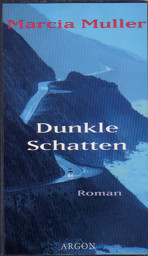Muller Marcia
Dunkle Schatten

Nur auf dringende Empfehlung hin war der Leseteufel bereit, sich noch einmal an einen Krimi von M. Muller zu machen, und es hat sich gelohnt.
Er spielt in einem fiktiven “Soledad County” an der Küste Nordkaliforniens, einem nebligen, düsteren Küstenabschnitt, wie das Titelbild gut zeigt. Vor 13 Jahren fand hier ein Massacker statt, an dem die damals gerade eingestellte Polizeibeamtin Rhoda Swift immer noch leidet, weil der Fall bis heute nicht aufgeklärt ist.
Da wird an der Ausweichstelle des Point Deception eine junge Frau ermordet, die viele an ihrem liegen gebliebenen Auto hatten stehen sehen, ohne zu halten, auch Rhoda selbst.
Die Ermittlungen schleppen sich voran. Rhoda bekommt Unterstützung durch Guy Newberry, einen Schriftsteller, der Bestsellerromane über solche heimgesuchten Orte schreibt und sich zu Recherchen hier aufhält.
Sehr behutsam, aber konsequent treibt Muller die Handlung voran, wobei Cascade Canyon, in dem damals das Verbrechen geschah, die düstere Hauptrolle spielt. Nach zwei weiteren mysteriösen Todesfällen gelingt die Aufklärung auch des alten Verbrechens und der Leseteufel kann hoffen, dass Guy und Rhoda bei weiteren Fällen zusammenarbeiten, in ähnlicher Konstellation wie in der TV-Erfolgsserie “Castle”.